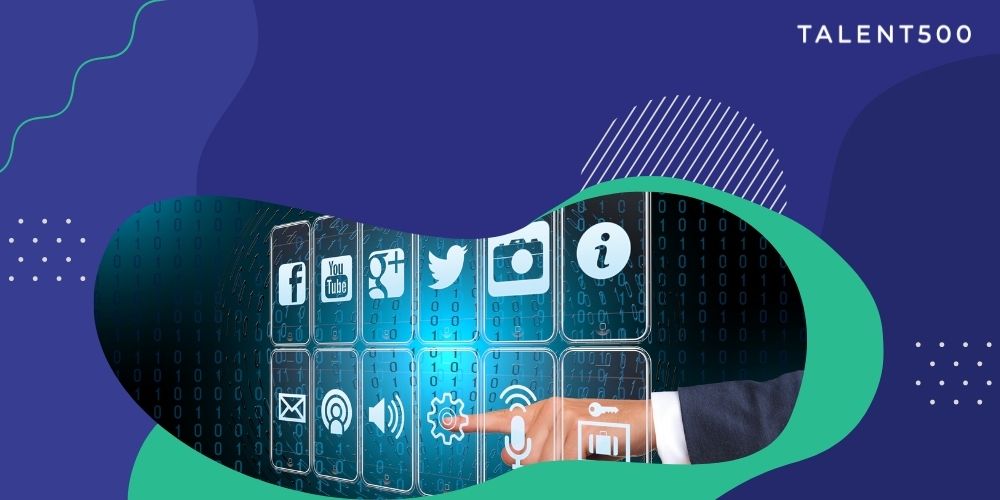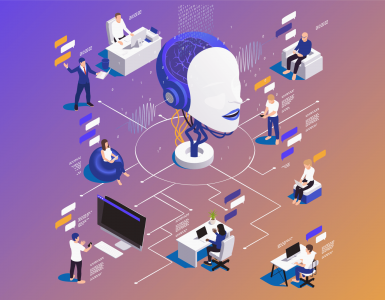With the rise of unique and progressive working models, practices like ‘WFX’ are now in effect and have become a mainstay in leading companies. Top enterprises like Amazon, Facebook, Salesforce, IBM, Capgemini, and others are paving the way forward, setting new standards across industries. It would seem that the corporate ecosystem, as a whole, is undergoing fundamental and disruptive changes. At its core are technologies like AI and machine learning, key enablers aiding and optimizing processes for seamless function. In fact, The World Economic Forum pointed out that in 10 years, 9 out of 10 jobs will require some amount of digital skill.
Considering the digital transformation (DT) afoot, today’s leaders have a challenging road ahead, mainly in establishing the workforce of tomorrow. Hiring practices will need redefining as will the upskilling and reskilling strategies if companies are to transition seamlessly. This paradigm shift is no overnight task and demands a strong vision and plan of action. To know why digital-ready workforces must be prioritized and how companies can build these teams, read on.
The Remote Revolution is underway
Since 2005, there has been a spike in virtual and remote work, and it saw a 159% growth before 2020. A PWC Future of Work survey found that 41% of remote workers want no change in their working model, which was a sharp 12% increase from data collected previously. All this suggests is that the modern employee prefers the remote working model, and more so each year. The 2019 pandemic definitely played a key role in this drastic shift, and in many ways, the modern remote workplace has proven to be a superior solution.
Physical workplaces had obvious limitations that remote working simply does not. For one, companies can now fully leverage the power of distributed teams and global talent. This has several benefits, among which is that it provides access to a higher quality employee. Additionally, remote or hybrid working has had a significant impact in improving diversity and inclusion in enterprises across the globe.
Companies now have access to the required infrastructure to sustain, manage, and employ individuals across time zones seamlessly. As a result, building a highly skilled digital-ready workforce was the natural next step, especially if companies are to thrive in the post-pandemic VUCA (volatility, uncertainty, complexity, and ambiguity) world.
The roadmap to building digital-ready workforces
For companies operating on legacy models, embracing the change isn’t easy. Fortunately, there are frameworks that can guide systemic reform. For instance, Deloitte Digital suggests that these are primary elements of DT:
- Forming a digital work environment
- Implementing rapid changes in business models and products
- Expanding the organization management processes
- Involving customers in different communication channels
Here, the first focus is on restructuring the workplace. Overcoming corporate cultural hurdles is key to forming a highly-skilled digital-ready workforce. Ideally, the focus should be to institute policies that promote flexibility across sectors in the organization. Work should be possible even when there is asynchronous communication. One way to achieve this is to pave the way for collaboration and engagement digitally. The digital ecosystem is all about rapid progress, and companies need to adopt modern technologies that allow for it.
The next area to focus on is upskilling. This is very different from reskilling, which is often used interchangeably. Upskilling must occur as digital disruption demands constant learning to be leveraged fully. In fact, PWC will spend 3 billion USD for the coming 4 years to upskill their employees. This investment will go toward upskilling for 8 essential technologies, which are:
- Augmented Reality (AR)
- Artificial Intelligence (AI)
- Drones
- Blockchain
- 3D Printing
- Robotics
- Virtual Reality (VR)
- Internet of Things (IoT)
The exemplars
DT is at the forefront of disruption and these 10 companies have successfully embraced it, even setting standards.
- Unilever
- Porsche
- Keller Williams
- Starbucks
- DHL
- LEGO
- IKEA
- Walmart
- Nike
- McDonald’s
The major industry leaders are leveraging all that DT has to offer on the backs of a highly skilled digital-ready workforce. To get on board, partner with Talent500 and get started on the right foot. Bring on the best people with relevant skills and scale as intended for the hybrid ecosystem.
With pre-assessment tests and intelligent AI-enabled tools, we source the best candidates across various parameters and help you build global teams efficiently. Our Fortune500 partners have trusted us to aid them in their transformational journey, and we have delivered. To know the different solutions on offer, schedule a consultation.






Add comment